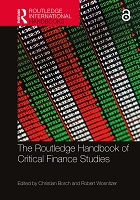The Routledge Handbook of Critical Finance Studies
Proposal review

Contributor(s)
Borch, Christian (editor)
Wosnitzer, Robert (editor)
Language
EnglishAbstract
The term “financialization of everyday life” has become a buzzword in recent years. As it is often the case with buzzwords, the financialization of everyday life literature is informed by a variety of conceptual uses, theoretical traditions, and critical angles. This chapter provides an overview of this dynamic field. The first part looks at different definitions of the financialization of everyday life, contrasting three main uses of the term. The second part focuses on the commonalities across different stands of the financialization of everyday life literature and explains their shared starting point: the socio-economic processes associated with neoliberalism that are seen to have given rise to everyday financialization. The third part, in turn, discusses the differences between the main theoretical traditions as part of which the financialization of everyday life has been studied: (1) Foucauldian governmentality approaches that undoubtedly had the biggest impact on the field, (2) (cultural) economic sociology in a Weberian and Zelizerian tradition, (3) social studies of finance, and (4) the sociological study of inequality. The fourth part examines the critical angles used by each tradition, and the chapter concludes by considering the ways in which the field enables constructive criticism of contemporary finance.
Keywords
finance; economics; sociology; financial crisisISBN
9781138079816, 9780367539184Publisher
Taylor & FrancisPublisher website
https://taylorandfrancis.com/Publication date and place
2020Imprint
RoutledgeClassification
Financial accounting
Corporate finance
Business and Management
Economics
Finance and the finance industry
